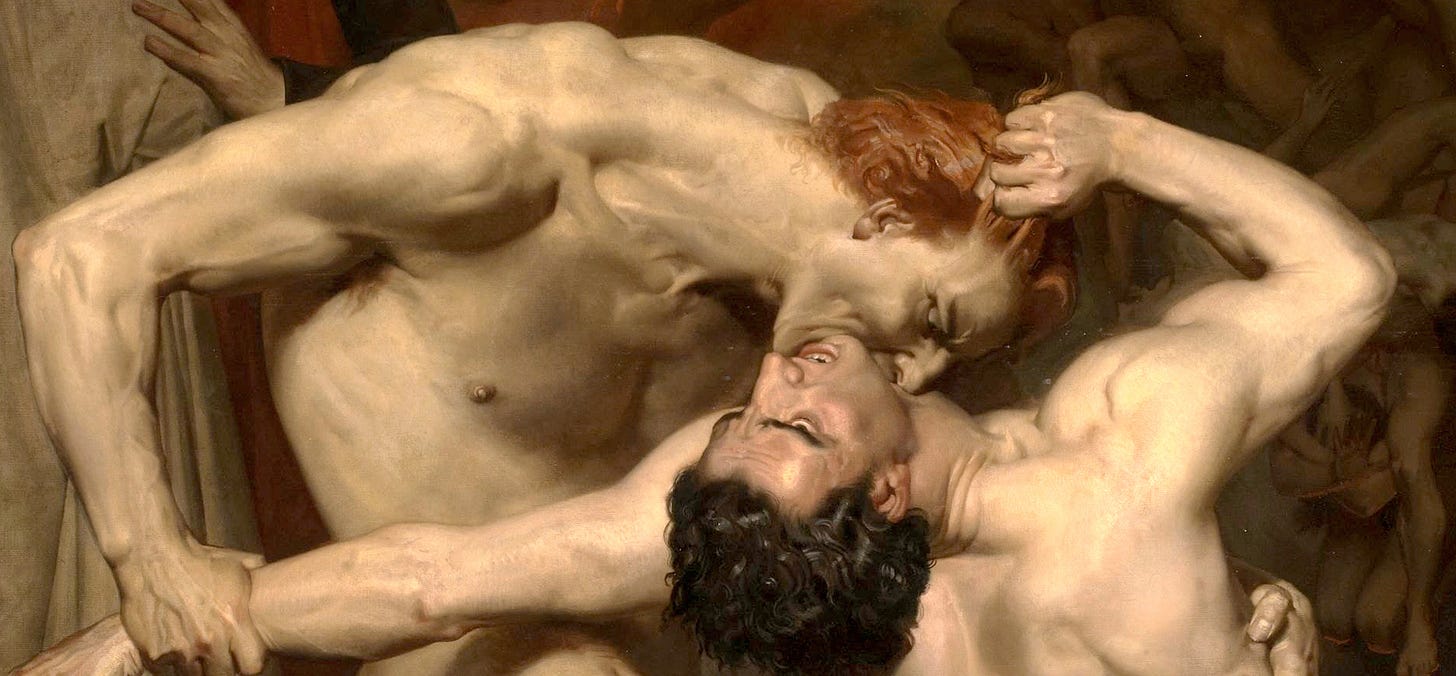the cannibalism metaphor
for those who are monsters and monsters who are still human; a love letter
You were born with sharp teeth and an endless starvation. They don’t have to say it for you to know it: there is something wrong with you that cannot be fixed.
It is not hard to smile in ways that mask your teeth and it is not hard to ignore the hunger that gnaws at your insides like a knife dragged slowly through the lining of your stomach. You are lucky you are quick to learn because you see what they do to those that do not know how to hide. They call it survivor’s guilt, the way you feel as you watch them take up their pitchforks and torches, but you don’t feel so much a survivor as further down the execution line.
You learn to keep your distance. The closer you get, the stronger the scent of blood. The smell feels like a prophecy: your craving a sign of divine punishment for a sin you do not understand. Their flesh is between your teeth before you can even ask God to forgive you for a crime you have not yet committed. You do not have to look up to see the terror on their face; you do not have to look up to know that you are a monster.
Monster. The word feels heavy on your tongue, but you know there is no point to sugar-coating the truth. You want to say, “I don’t know why I bite”, you want to beg for forgiveness, but you know there are some sins that cannot be repented for and so you learn to say “stay away” instead. And maybe this is for the best; when solitude is all you have ever known, the isolation feels less a curse and more a birthright.
You start to think the core of the cannibalism metaphor is that you are alone.
You smell the blood first. Blood, plural. The scent of two people’s blood on one person is not foreign to you, but on someone other than yourself, it feels alien. Maybe it’s the extra iron, but you find yourself magnetized. You feel akin to a flame to a moth; you have spent your whole life learning why you are dangerous, the scent of blood being one of the reasons.
You know that if you are dangerous for this reason, so are they, but in their shadow, you find yourself still begging for forgiveness for a crime not yet committed. “I’m sorry I bite”, you say, “I’m sorry my teeth are sharp and I am always hungry.”
You put your hand in the lion’s mouth and let the blood soak their teeth. The blood is yours, but you apologize anyway. “I’m sorry for the blood,” you say, “and I’m sorry for the hunger.”
And they echo, “why are you always apologizing? Why do you forgive so easily?” And they echo, “do you not bleed, too?”
And in their reflection, you start to maybe believe your teeth are not as wrong as the God that sharpened them. And with your hand in their mouth and their arm in yours, you learn there are softer ways to solve your hunger. And in the warmth of this fresh blood, you are no more monster than human.
“We are doomed to hurt each other,” you want to say, but the words feel silly, now. There is reciprocity in your words now; when did I become we? We are doomed to hurt each other, you have always said, but the words until now have come out as I will hurt you. There are ways to measure pain that you have never understood and you have always known the scales were never tipped in your favor. And perhaps you are still searching for salvation in this equivalent exchange.
One of us is doomed to hurt the other, but the story has always had to end this way. One of us is doomed to hurt the other, but there is no doom because a propensity for harm came with being human. And maybe because you have always felt your humanity could only be adjacent to your monster-hood at best, the words catch on your tongue before you can say them. But you are no more monster than human when your flesh bleeds all the same and maybe forgiveness is not so far out your reach as you’d believe.
You press your teeth into their neck. You are no more monster than human. There is blood on your face; some of the blood is yours, some theirs. It all looks the same.
This post has an additional On Writing.






We don’t know how or when reflective (mimetic) consciousness developed in humans. But somehow we are condemned to seeing our “selves” through the imaginary eyes of imaginary others. Somehow we are condemned to struggle to manage HOW we imagine ourselves and therefore HOW OTHERS imagine us. Our psyches are therefore infinitely brittle, infinitely permeable, infinitely expansive, infinitely intrusive, infinitely malicious, infinitely dangerous, and infinitely generative, rapacious, compassionate, hopeful, and abject.
You put your hand in the lion’s mouth and let the blood soak their teeth. The blood is yours, but you apologize anyway. “I’m sorry for the blood,” you say, “and I’m sorry for the hunger.”
I once wrote this in a letter to a friend: "I wish you wouldn’t light yourself on fire for other people, because I think that there’s a part of you that likes that about yourself, even though you know it’s not good. There’s a part of me that likes that about you too. "
There's this tendency among the kind to bear the weight of morality even if it's not theirs. They are infinitely kind to others and infinitely punishing to themselves. It's hypocritical. It's arrogant. Yet there is this shining allure to it nonetheless.